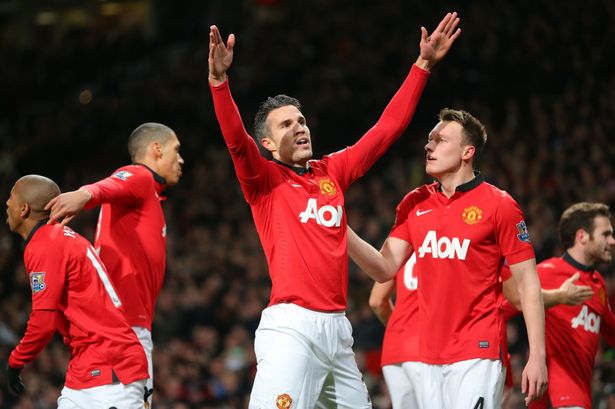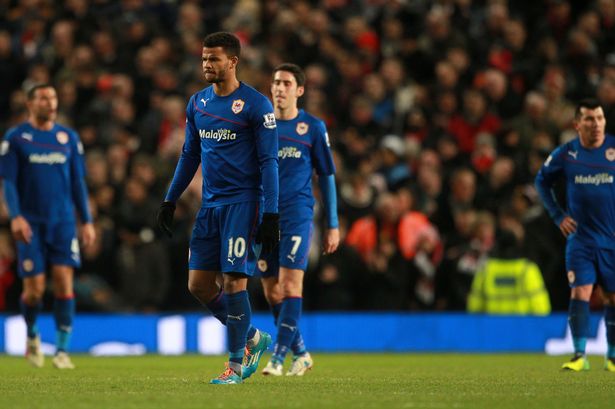When the fixtures were announced last June, it was impossible not to look at our games for January and gulp – Arsenal, Manchester City and Manchester United all away, thank God for that home match with West Ham in amongst them all! When we duly made a mess of things against a woefully out of form Hammers side beset by injuries, it was almost a given that we would have a pointless January and go into February at the bottom of the league.
Last night’s 2-0 loss at Old Trafford ensured that both of these events came to fruition and we now wait to see if Sunderland and West Ham can cash in on their game in hand on us against Stoke and Chelsea respectively tonight. With Palace and Swansea winning (albeit against other sides involved in the relegation scrap) and Norwich drawing, there is the chance that we will become a little detached at the foot of the table by this evening.
It’s not all bad news, just as at the Emirates and the Etihad, it was defeat with a fair bit of honour for City last night. We weren’t taken apart in any of the games and losses by a two goal margin with neutrals saying, mildly, reassuring things about our survival prospects could have been a lot worse I suppose, but a bit of deeper analysis into last night’s game in particular leaves me wondering if much has really changed as far as the team’s weaknesses are concerned since Malky Mackay left almost five weeks ago.

Robin Van Persie had not featured for Manchester United since missing the game at Cardiff City Stadium in November – typically he marked his return with a goal as his header put the home team ahead in just six minutes.*
I’d like to say a belated thank you to the person on one of the City messageboards who postedthis article last week – it’s a long piece, but I thought it was a very good read. Particularly interesting for me was the bit which argued against the findings of Charles Reep in the 1950′s. Reep’s research was influential in encouraging British sides to play a long ball game which I would say became most fashionable in the mid to late 80′s (coincidentally or not, the period when Football League clubs were banned from competing in Europe).
Modern day research (according to this article anyway) says that the type of football preached by the likes of Reep and Charles Hughes (a one time Director of Coaching at the FA) is out of date and was never as effective as they claimed it was anyway – as an aside, speaking as someone who definitely wants a team I support to play a passing game, I have to say that I think, and hope, that football is more of a random game than the formularised fare the people at Prozone would have us believe it is.
Whatever my thoughts are, with all but one of the sides in the Premier League using an analysis tool which, on the face of it, proves the merits of a completely different approach from the long ball game, it’s no surprise that a more patient, passing game is now favoured by sides throughout the English pyramid system. The extent to which possession is valued may vary from club to club in the Premier League, but I would say that all sides now would prefer to have the ball than not have it – baffling as it seems to someone like me, that was far from the case decades ago when the giants (in a physical rather than a footballing sense!) of Wimbledon, Watford and both Sheffield clubs roamed the land.
So, if we accept for now that possession of the football is the object of the exercise in today’s game then I’d say your average City fan would have two responses if they had been told beforehand that their team would enjoy 54% of the possession in last night’s match. The first would be to pick themselves up off the floor after collapsing with shock and the second would be to ask “so we won’t get beat then?”.
Unfortunately, this is where theory ends and reality takes over – the result of all of that possession on the ground of the current league champions was a miserable one effort on target according to the BBC’s stats. Now, allowance needs to be made for who we were playing. Manchester United might not be the force they have been, but I’m certainly not ruling out them finishing in the top four yet and, despite the current “crisis” at the club they are still a good Premier League team – the odds were always very long on us avoiding defeat last night.
That said, it’s certainly illuminating to compare the stats from last night with three other away games we’ve played this season. At West Ham, Villa and Palace, we had 52%, 57% and 56% of the ball – add in Manchester United as well and we had a total of six on target efforts in the four games. There are those who say that Villa were there for the taking in November – I don’t agree, I thought they were the better side throughout, but the important point is that, even if we forget about that game, we ended up getting exactly what we deserved in the other three – nothing.
Possession might be vital nowadays, but the evidence of these away matches (where you would have thought we would have more space to create opportunities) is that it’s not enough in City’s case. The same sort of thing applies at home – while we might not have had the majority of the possession in all of these games, the visits of Swansea, West Brom, Southampton, Sunderland and West Ham saw us win the territorial battle, but to what effect? Four goals and, Sunderland, apart, very few moments of danger for our opponents.
For me, we have had problems in the transition between turning promising situations, both in terms of possession and field position, into strikes on target all season. Obviously, this is reflected in our goalscoring record, but are our strikers to blame for the fact that we are so poor at putting the final touches to these promising situations? When you think of it, a book detailing sitters missed by City strikers this season would be a pretty thin volume, so, either our forwards are putting themselves in the wrong positions to benefit from the quality passes being provided for them or those passes just don’t exist – or at least, come along very rarely.
I’d say there is an element of truth to that first alternative (there were certainly a couple of occasions last night when City players couldn’t get on the end of fine crosses from our full backs), but I feel the problems lie more with the second option.

That all too familiar sinking feeling – City players trudge back to restart the game after conceding the first goal for the sixteenth time in twenty three league matches.*
We now face a month of matches against sides in what our manager calls the second division of the Premier League. Norwich (who have a good record against sides in Ole’s second division), Villa (most effective on the break away from home) and Hull (who have handled the step up in class better than we have so far) will all come to Cardiff City Stadium knowing that a draw will probably suit them and it could well mean three more matches where we have the majority of possession and dominate territorially as they sit back and make things difficult for us.
We simply have to find a way of of improving our efforts on target figures. In his post match interview Ole seemed to acknowledge this and came up with as good a way of describing it as any when he said we need more “oomph”. A committed Kenwyn Jones could provide that in terms of power and aerial ability and a Wilfred Zaha playing to the levels he did at the back end of last season could as well, but I maintain that it also needs to come in the form of more guile and creativity in and around our opponent’s penalty area. Kimbo, Gunnarsson, Mutch and Whittingham have had their moments this season as far as this requirement goes, but it’s an indictment of our more senior players that, based on the little I’ve seen of him so far, eighteen year old Mats Møller Dæhli looks the best bet we have of providing those cute little passes that can unlock defences at this level.
One last thing, I hope Ole is emphasising that we cannot keep on starting games so poorly – our three league games under him have seen us take forty five minutes to wake up against West Ham, defending desperately for fifteen minutes against Man City and conceding after just six minutes against Man United – without Ole’s oomph we aren’t capable of scoring twice to win February’s big games.
* Pictures courtesy of http://www.walesonline.co.uk/
http://mauveandyellowarmy.net/